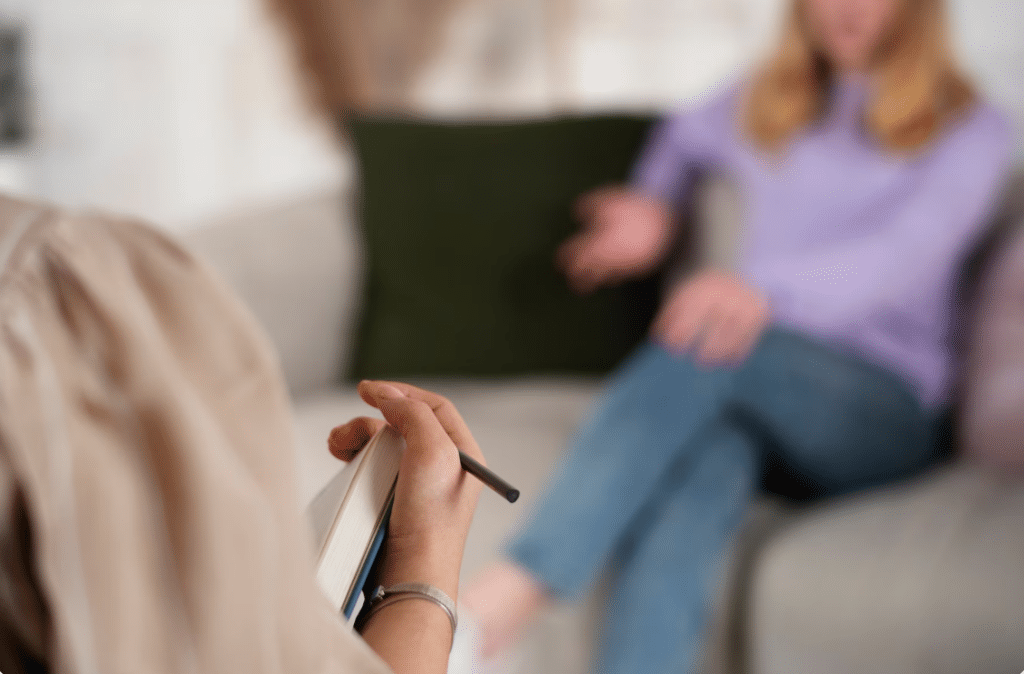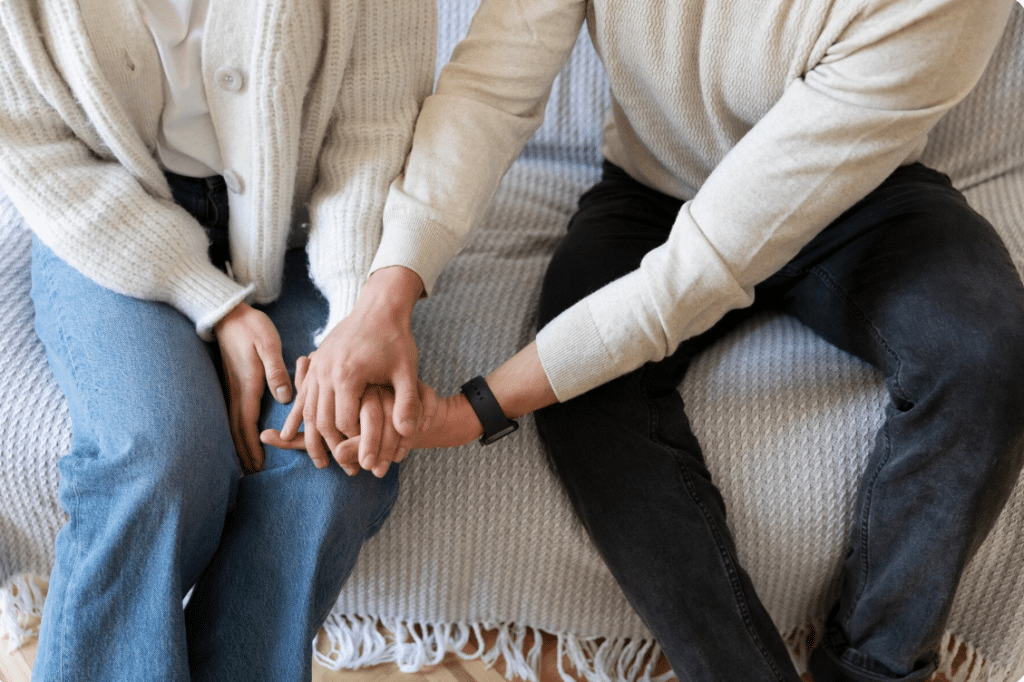Can I Go to Couples Therapy Alone?

Even if you’re considering solo counselling, know that many individuals share the same concern as yours. Also, even when both partners aren’t ready, one person’s commitment can spark significant positive change.
This is where solo counselling can be a proactive step. By focusing on your own thoughts, behaviours, and communication, you can initiate a ripple effect, fostering healthier dynamics and guiding your relationship towards healing and growth.

Why Would Someone Go to Couples Counselling Alone?
It is a common and often disheartening experience when one partner recognises relationship challenges and feels an urgency to address them, yet the other partner is unwilling, unavailable, or in denial about the need for support. This can lead to immense emotional distress and a sense of helplessness for the individual seeking change. And when their partner won’t go to counselling sessions, they may believe their hands are tied.
However, going to couples counselling alone isn’t about abandoning the relationship or assigning blame to the absent partner. Instead, it’s a proactive and empowering step.
For one, it acknowledges that you have control over your own contributions to the relationship dynamic. In solo therapy, the focus shifts from waiting for your partner to engage to understanding your own patterns, developing healthier behaviours, and learning effective coping strategies. This individual growth can often create a positive shift in the relationship, even without the other person present in the session.
Can Solo Marriage Counselling Help?
Research indicates that even when only one individual attends relationship counselling, there can be a significant reduction in psychological distress over time. Furthermore, the results are evident in the individual’s relationship status, family function, and working alliance with their partner. This also demonstrates the profound power one person holds within a relationship dynamic.
When you choose to change your own behaviours, thoughts, and communication patterns, it disrupts established negative cycles, much like altering your dance steps in a routine encourages your partner to adapt theirs.
Even in solo marriage counselling, key therapeutic frameworks empower individual effort. Approaches like Gottman’s Couple Method Therapy provide insights into fostering healthier interactions and individual contributions to relationship well-being. Similarly, Choice Theory Reality Therapy, focusing on personal responsibility and choice, guides you to align your actions with your core needs, leading to more fulfilling connections.
By proactively engaging in individual counselling to address relationship issues, you take full control of your part in the partnership, initiating a ripple effect that can foster more positive and responsive dynamics, even if you go to the sessions without your partner.
What Can You Expect from Solo Relationship Therapy?

If you are not happy with your relationship, you actually have 100% control over your half of the relationship … and that means you have 100% control over your choices, actions, and thoughts. If you really want to bring about change, there is no purpose in handing the repair of the relationship to a non-cooperative partner and making your behaviour conditional on his/her participation. Instead, you can start learning skills to make the relationship better without your partner.
In solo relationship therapy, you can expect to develop essential skills, such as enhancing emotional regulation and establishing healthy boundaries. You will also learn to communicate assertively, expressing your needs and feelings more effectively.
A significant part of the process involves understanding your personal relationship patterns and identifying any self-sabotaging behaviours that might hinder connection. Therapy also helps you delve into your attachment style and recognise your triggers, providing deeper insight into your reactions.
Crucially, you can set meaningful relationship goals, even if your partner isn’t present in the sessions. During the process, you may identify areas for improvement and even consider sex therapy to improve intimacy in your relationship or counselling for a cheating spouse to understand coping mechanisms for recovering from the effects of infidelity. Ultimately, you can foster personal growth that can positively influence the shared dynamic.
What if My Partner Never Joins?
Even if your partner never decides to participate, going to relationship counselling alone offers substantial benefits for your individual well-being and clarity. Solo counselling, even when held as online therapy sessions, can help improve your self-worth, learn to navigate conflict more effectively, and reduce personal distress within the relationship dynamic.
This individual growth can lead to a clearer understanding of your needs and options, whether that means fostering a healthier version of the current relationship or determining a different path forward. Sometimes, witnessing your personal positive changes and increased emotional regulation can even motivate your partner to reconsider their stance on therapy and eventually join the process.
Tips for Making the Most of Solo Counselling for Relationship Issues
To maximise the benefits of individual therapy for relationship issues, here are some practical tips to guide your journey:
- Open Mind and Realistic Goals: Approach therapy with an open mind, ready to explore your own contributions to the relationship dynamics, and set achievable goals for personal growth rather than expecting instant, radical shifts from your partner.
- Focus on Your Part: The power of solo relationship therapy lies in your ability to control your own responses, so concentrate on understanding your needs, boundaries, and communication patterns.
- Avoid Fixing Others: This approach is about personal empowerment, and you need to resist the urge to use insights gained to manipulate or force your partner to change. Instead, apply them to refine your own behaviour.
- Apply Skills Daily: Practise new communication techniques, boundary setting, and emotional regulation in your daily life to enhance your overall well-being.
- Reflect on Progress: Take a moment to observe how your changes affect your interactions. Also, acknowledge small victories and discuss challenges in your sessions to adapt your strategies.
When Solo Therapy Transitions to Couples Therapy

When one person actively engages in solo counselling and significantly changes their behaviour within a relationship, it often disrupts the existing dynamic, creating new possibilities for growth. We frequently observe that clients who initiate individual therapy for relationship issues often find that their partners become more open to joining therapy as well.
As personal growth becomes evident and a sense of trust in the therapeutic process develops, initial resistance can lessen. When both partners are ready to participate in couples counselling, the benefits are amplified, allowing for direct and collaborative work on shared challenges, a deeper understanding, and comprehensive rebuilding of the relationship.
Get Started with Solo Counselling in Singapore
If you want help learning how to set in motion more targeted and positive efforts to improve your relationship, solo counselling can help you. And when you choose All in the Family Counselling, you’ll work with our individual, couples’, and family therapist who offers a confidential and non-judgmental space focused on developing practical skills.
For instance, Tammy Fontana, an experienced expat counsellor and psychotherapist in Singapore, brings over 6,000 clinical hours and extensive training, including Choice Theory, Reality Therapy and Gottman’s Couple Method Therapy, to guide you. Her focus is on helping you gain insight and implement effective strategies for positive change.
Call us at 9030 7239 to book an initial consultation and discuss your needs, discovering how this focused support can benefit you.
Schedule an initial consultation
Through an initial consultation we'll help you frame goals and outcomes of therapy and what that would look like to achieve it.
